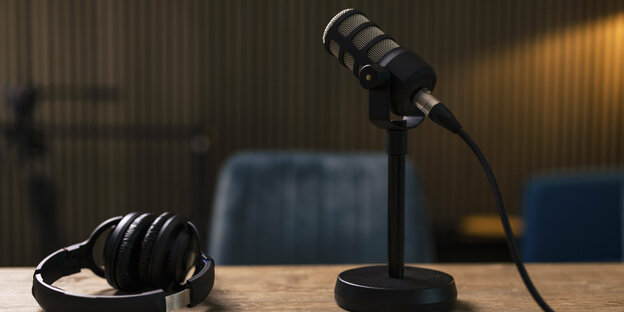The future of podcasts was discussed at the “All Ears” industry meeting. Spotify Forecast: Video podcasts will be the next big thing.

In addition to the microphone, you now also need a video camera to record the perfect podcast Photo: imago
If you have to keep saying everything is fine, you may not be sure that everything is fine after all. Or: If you repeat something enough times, people start believing in it and it becomes real. Anyone who attended this year's Spotify “All Ears” Podcast Summit might have had these thoughts. At the industry meeting held on Thursday at the Wilhelm studios in northern Berlin, representatives of the streaming service did not tire of underlining the development potential that still exists in the podcast market.
According to a survey last year by the digital association Bitkom, the number of podcast users in Germany has remained stable recently after having increased considerably in previous years: the share of podcast listeners over 16 years old increased from 33 percent in 2020 to 43 percent in 2022 and 2023. That corresponds to almost 30 million people.
At the beginning of the day, Daniel Nikolaou, director of the DACH Podcast at Spotify, spoke in his keynote speech about a meeting with a former Viva colleague who asked him if the topic of the podcast was not already over. Of course not!
But what can you really get out of this market so rampant that even podcast ultras can hardly keep an overview of what's on offer? This question was answered at this not entirely cheap event in the sector (tickets for 299 euros, food included) with many podcast celebrities (Felix Lobrecht, Luisa Neubauer, Michael Barbaro), both formally and in terms of content and aesthetics.
Spotify as a platform
For example, Spotify is now taking the next step, Nikolaou and other Spotify representatives explained: from being a publisher of its own exclusive podcast content, with which the streaming service initially had to differentiate itself from its competitors and develop dominance of the market, to become a platform. . A lot of work is currently being done to make this platform more attractive to podcast producers.
“We can only succeed if we help creators succeed,” said Sahar Elhabashi, vice president of podcasts at Spotify, in a conversation on “The Next Chapter of Podcasting.” The streaming service wants to achieve this by making data and statistics on usage behavior available to creators so that they can improve their offering accordingly.
So podcasts are a thing. But now video podcasts are here. “Podcasts and videos are converging,” says Elhabashi. The number of podcasts with video is currently growing nine times faster than with audio only. Three of the top 10 podcasts are video podcasts. 56 percent of users in the US said they prefer podcasts with video.
Video is particularly important for younger users. The possibly crucial reason why the people at Spotify like to observe this trend comes up in passing during the conversation with Elhabashi, full of numbers: the advertising market for video content is many times larger than that for audio content. Also: If podcasts now have a moving image, aren't they just good old videos that aren't really anything new?
Ultimately, the company wants to improve content visibility. Spotify wants to better evaluate data from existing users, also rely on artificial intelligence and create new tools, such as one that allows users to recommend content to each other.
New narrative forms
Beyond this naturally skewed view of Spotify's future, podcast creators also took a self-critical approach toward their own medium: Khesrau Behroz (Undone), for example, called for a bolder “new storytelling tradition” that's also untroubled. with journalism. must entertain. Leonie Bartsch (Murder on Ex), Daniel Müller (Time Crime) and Lilly Amankwah (funk/The Fall) stated during their true crime panel that not all brutal cases need to be told and that sociopolitical relevance is important.
Anne Will then provided particularly notable evidence that podcasts are far from over. During her appearance on the day her new podcast “Politics with Anne Will” launched, she said she appreciated what wasn't possible in the medium on her Sunday talk shows: the depth of content.
Which opens up an interesting perspective: if classical political journalism could use this medium to take more time to do justice to its complex issues, instead of letting politicians discuss them non-objectively in prime time and try to limit damage, then many things would be gained. cattle.
